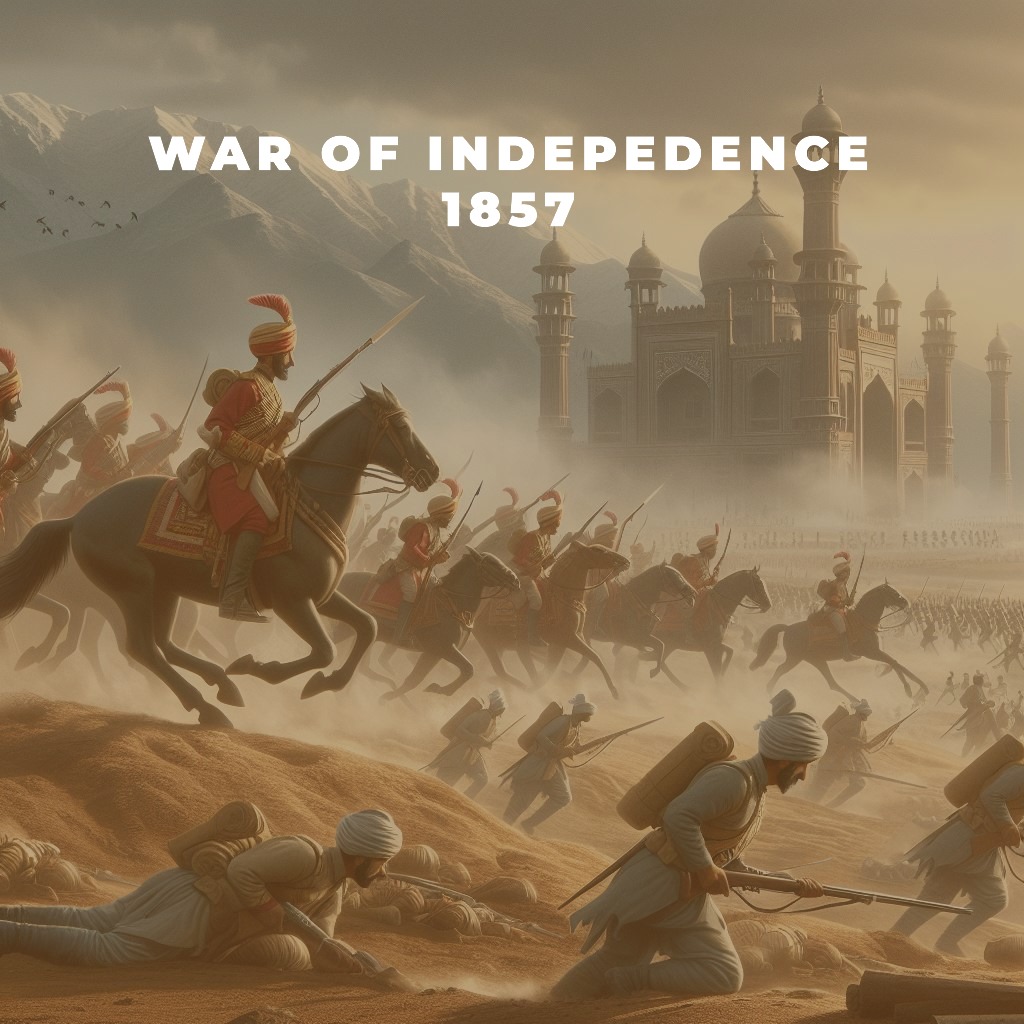The year was 1857, and India was under the rule of the British East India Company. During this time, a significant event unfolded—the Indian War of Independence. It is also known as the Sepoy Mutiny or the Great Indian Rebellion. The Great War of Independence marked the beginning of a fierce struggle for freedom from foreign domination. The war began on May 10, 1857.
What was the main cause of the First War of Independence?
Nevertheless, many scholars believe that the cartridge issue started the War of Independence. The rebellion wasn’t just about the cartridges; it was a culmination of various factors:
Political Causes of the War of Independence 1857
Discriminatory Policies of the East India Company
Indians were unhappy with The East India Company. The reason is that it had imposed various discriminatory policies. The economic exploitation of the Indians fueled their frustration.
Moreover, the Indian soldiers were paid a lot less than the British soldiers. The East India Company had also imposed heavy taxes on the peasantry. Hence, such policies forced the soldiers and civilians to take part in the War of Independence of 1857.
The Doctrine of Lapse of 1848
The Doctrine of Lapse was introduced in British India by Lord Dalhousie. This policy of the East India Company was a threat to the Kings who could not have any offspring. Such kingdoms were to be annexed with the territory of the East India Company.
Additionally, such kings and queens were not allowed to adopt children. Therefore, the Queen of Jhansi and the Nana Saheb of Maratha took part in the 1857’s First War of Independence.
Social Tensions Before the Revolt of 1857
Indian Customs Were Challenged by the East India Company
The Indian soldiers were not allowed to wear turbans and to apply tilak on their foreheads. It created a sense of insecurity between the soldiers. They considered it a kind of insult to their culture. Soldiers were the ones who began the War of Independence on May 10 1857.
Further, the Hindu widows practiced Sati. In this ritual the widow was burnt alive with the dead husband. The British under the governorship of Lord William Bentinck had banned this practice. Therefore, the Hindus became angry. They felt that British government was interfering with their religious matters.
Likewise, the Hindu widows were not allowed to remarry. However, the British had introduced the Widows‘ Remarriage Act in 1856. The Hindus were not happy with this act.
Biases Towards the Indian population
The Indians were treated as a lower class than the British. They were treated badly and were called names. Therefore, the Indians felt disowned by the East India Company.
Military Unrest Because of the Greased Cartridges
The East India Company had introduced greased cartridges. There was widespread rumor it contained fat of cow and fork. Since Muslims consider fork haram and cow is sacred for Hindus, so they refused to use it. Their refusal ultimately triggered the Great Rebellion on May 10, 1857.
Why did the War of Independence 1857 Fail?
Lack of Unified Leadership
Although, the Mughal Emperor Bahadur Shah Zafar led the war of Independence 1857, he was not competent. He did not take charge as a true leader. In fact he was busy writing poetry during the great revolt.
Therefore, the rebels lacked a central figure, who could lead them effectively in the revolt of 1857. In addition, different groups fought independently. This division was weakening their impact. Without unified leadership, their efforts remained fragmented. Consequently, the revolt of 1857 failed.
The British Military Was Superior to the Rebels
The British had better-trained troops and modern weaponry. They followed a centralized command. Additionally, they had a cause to fight for. Their logistical advantage allowed them to respond swiftly. The rebels struggled to match this military strength during the Mutiny of 1857.
Limited Geographical Reach and Connectivity
The rebellion wasn’t uniform across India. Some regions remained loyal to the British. The lack of widespread participation hindered its success.
Furthermore, the Indian fighters did not have any modern technology of communication. They were unaware about the condition of other fighters in different regions. This lack of connectivity was an advantage for the British Government in Mutiny.
The Sikhs and Gorkhas Supported the British
The forces of East India Company had the full support of Sikhs and Gorkhas during the War of Independence. They were ready to fight for the Company. The loyalty of Sikhs and Gorkhas gave the British forces an edge over the rebels.
International Isolation Was Another Reason for the Failure of the War
The rebels received little external support. Other nations were cautious or indifferent. Without allies, their cause faced isolation. Hence, the Great War of Independence failed.
The Brutal Suppression by the British
The British responded ruthlessly. The leaders of the rebels were executed. Hence, fear tactics weakened the rebel’s morale. Therefore, it worked well for the British during the Mutiny of 1857.
Conclusion
Despite courage, the Indian War of Independence fell short. However, it sowed seeds of resistance. Further, it inspired future freedom movements.

